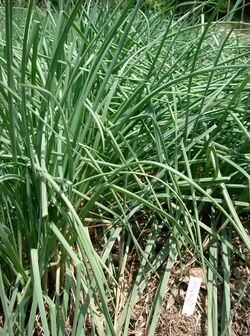Biology:Allium chinense
| Chinese onion | |
|---|---|

| |
| Scientific classification | |
| Kingdom: | Plantae |
| Clade: | Tracheophytes |
| Clade: | Angiosperms |
| Clade: | Monocots |
| Order: | Asparagales |
| Family: | Amaryllidaceae |
| Subfamily: | Allioideae |
| Genus: | Allium |
| Subgenus: | A. subg. Cepa |
| Species: | A. chinense
|
| Binomial name | |
| Allium chinense | |
| Synonyms[2] | |
|
Synonymy
| |
Allium chinense (also known as Chinese onion,[3][4] Chinese scallion,[3] glittering chive,[5] Japanese scallion,[3] Kiangsi scallion,[4] and Oriental onion[3]) is an edible species of Allium, native to China ,[3] and cultivated in many other countries.[6] Its close relatives include the onion, shallot, leek, chive, and garlic.[7]
Distribution
Allium chinense is native to China (in Anhui, Fujian, Guangdong, Guangxi, Guizhou, Hainan, Henan, Hubei, Hunan, Jiangxi, and Zhejiang provinces).[3] It is naturalized in other parts of Asia as well as in North America.[3][8][9]
Uses
Culinary
Owing to its very mild and "fresh" taste, A. chinense is often pickled and served as a side dish in Japan and Vietnam to balance the stronger flavor of some other component in a meal. For example, in Japanese cuisine, it is eaten as a garnish on Japanese curry.[10]
In Vietnam, pickled A. chinense, known as củ kiệu, is often served during Tết (Lunar New Year).[citation needed]
In Japanese, it is known as rakkyō (辣韮 or 薤). Glass bottles of white rakkyō bulb pickles are sold in Asian supermarkets in North America.[11]
Medicinal
Allium chinense is used as a folk medicine in tonics to help the intestines, and as a stomachic.[12]
See also
- Allium tuberosum, also known as garlic chives – Species of onion native to southwestern parts of the Chinese province of Shanxi
References
- ↑ Brummitt, N. (2013). "Allium chinense". IUCN Red List of Threatened Species 2013: e.T44392537A44396666. doi:10.2305/IUCN.UK.2013-2.RLTS.T44392537A44396666.en. https://www.iucnredlist.org/species/44392537/44396666. Retrieved 18 November 2021.
- ↑ 2.0 2.1 "Allium chinense". World Checklist of Selected Plant Families. Royal Botanic Gardens, Kew. http://apps.kew.org/wcsp/namedetail.do?name_id=295288.
- ↑ 3.0 3.1 3.2 3.3 3.4 3.5 3.6 {{citation | mode = cs1 | title = Allium chinense | work = Germplasm Resources Information Network (GRIN) | url = | publisher = [[Organization:Agricultural Research ServAgricultural Research Service (ARS), United States Department of Agriculture (USDA) | access-date = 2017-12-15 }}
- ↑ 4.0 4.1 Multilingual Multiscript Plant Name Database: Allium. University of Melbourne. Updated 3 August 2013. Retrieved 5 September 2014.
- ↑ English Names for Korean Native Plants. Pocheon: Korea National Arboretum. 2015. pp. 347. ISBN 978-89-97450-98-5. http://www.forest.go.kr/kna/special/download/English_Names_for_Korean_Native_Plants.pdf. Retrieved 17 December 2016.
- ↑ Flora of China Vol. 24 Page 196 藠头 jiao tou Allium chinense G. Don, Mem. Wern. Nat. Hist. Soc. 6: 83. 1827.
- ↑ Block, E. (2010). Garlic and Other Alliums: The Lore and the Science. Royal Society of Chemistry. ISBN 978-0-85404-190-9. https://books.google.com/books?id=6AB89RHV9ucC.
- ↑ "Allium chinense Rakkyo PFAF Plant Database". https://pfaf.org/user/Plant.aspx?LatinName=Allium+chinense.
- ↑ "Allium chinense". Natural Resources Conservation Service PLANTS Database. USDA. https://plants.usda.gov/core/profile?symbol=ALCH5.
- ↑ "Japanese beef curry (Curry Rice)" (in en). 2007-02-06. https://justhungry.com/japanese-beef-curry.
- ↑ "Niitakaya Rakkyo". https://asiamartsr.com/products/niitakaya-rakkyo-pickled-scallion.
- ↑ James A. Duke. "Allium chinense (LILIACEAE)". Dr. Duke's Phytochemical and Ethnobotanical Databases. https://phytochem.nal.usda.gov/phytochem/ethnoplants/show/20132.
External links
| Wikimedia Commons has media related to Allium chinense. |
- Botanical drawing of Allium chinense at Tropicos.org
- "Allium chinense". http://www.pfaf.org/user/Plant.aspx?LatinName=Allium+chinense.
- "Allium splendens". http://www.pfaf.org/user/Plant.aspx?LatinName=Allium+splendens.
Wikidata ☰ Q422240 entry
 |




